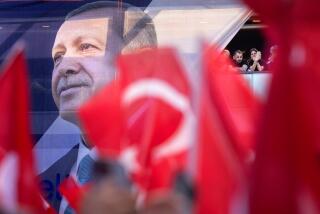Clinton Stresses Rights in Turkey
- Share via
ANKARA, Turkey — President Clinton saluted Turkey on Monday as a critical player at the crossroads of Europe and Asia, while urging it gently to continue on a path of respecting human rights and encouraging it to ease tensions with Greece.
Recognizing Turkey’s pledge to prohibit torture and protect political rights, the president told the Turkish Grand National Assembly that such steps “will be the most significant sign of Turkey’s confidence in looking to the new century and, in many ways, the most meaningful measure of your progress.”
In Turkey, respect for human rights has had a rough history, with political dissent treated harshly in the past and the Kurdish minority subject to violent repression.
With Clinton at his side, Turkish President Suleyman Demirel acknowledged that “it is impossible to say there is no torture in Turkey; there is torture. But torture is not a state policy.”
On a day of progress--long elusive--on a raft of foreign policy issues, Clinton pressed the role of democracy in the corner of Europe where it was born--but where respect for it has been lacking.
During a 24-hour period, agreement was reached in Beijing to bring China into the World Trade Organization, Greek and Turkish Cypriots agreed to resume reconciliation talks, progress was reported in implementing the Good Friday agreement in Northern Ireland and, in Washington, Clinton administration and congressional negotiators overcame years of dispute concerning payment of the United States’ dues to the United Nations.
“This has truly been an important day for American foreign policy,” said Samuel R. “Sandy” Berger, Clinton’s national security advisor.
It is rare, after the president has flown all day and slept little overnight, for him to greet his first audience of the day with a smile--and on time.
Nevertheless, he was in good humor, and only 10 minutes late, when he greeted the staff of the U.S. Embassy in Ankara on Monday morning with the news that the United States and China had completed the arduous trade negotiations.
“He came out smiling and ready to talk,” said White House Press Secretary Joe Lockhart.
Later, Clinton conferred with Demirel and Prime Minister Bulent Ecevit, expressing approval of the limited rapprochement between Turkey and Greece, which was intensified by the mutual support they offered when earthquakes struck both countries within weeks of each other.
Clinton’s visit had prompted a protest in downtown Ankara, where demonstrations are illegal without permits. Police detained 110 demonstrators after shoving them into vans, Associated Press reported.
The president is spending five days in Turkey, only the third visit by a U.S. president here, after visits by Dwight D. Eisenhower in 1959 and George Bush in 1991. Today, he will visit a region devastated by an earthquake Aug. 17.
Turkey’s limited place in public diplomacy of this sort belies the role that the fall of the Ottoman Empire and Turkey’s birth as a modern state in 1923 has played in shaping the century.
From the Balkans in the north to the Middle East in the south, “a century of conflict erupted from the turmoil of shifting borders, unrealized ambitions and old hatreds,” Clinton said in a broadly philosophical speech to parliament.
The president also noted that Kemal Ataturk, the founder of the Turkish Republic, had delivered a six-day speech to parliament in 1927 surveying Turkey’s relations with the rest of the world, in which he said “the United States is more acceptable than the rest.”
“In an effort to remain more acceptable to you,” said Clinton, known himself for fully developed speeches, “I promise not to speak for six days.”
He delivered his remarks, interrupted only briefly by applause, in 26 minutes and 17 seconds. Two digital clocks counted out the time as he spoke.
More to Read
Sign up for Essential California
The most important California stories and recommendations in your inbox every morning.
You may occasionally receive promotional content from the Los Angeles Times.












